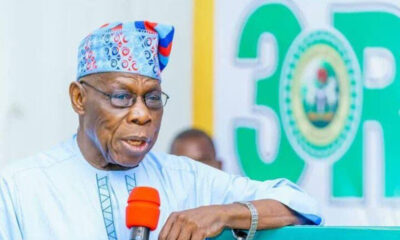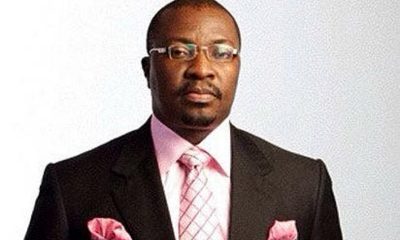News
Obasanjo, Jonathan, others to receive N13.8bn maintenance allowance
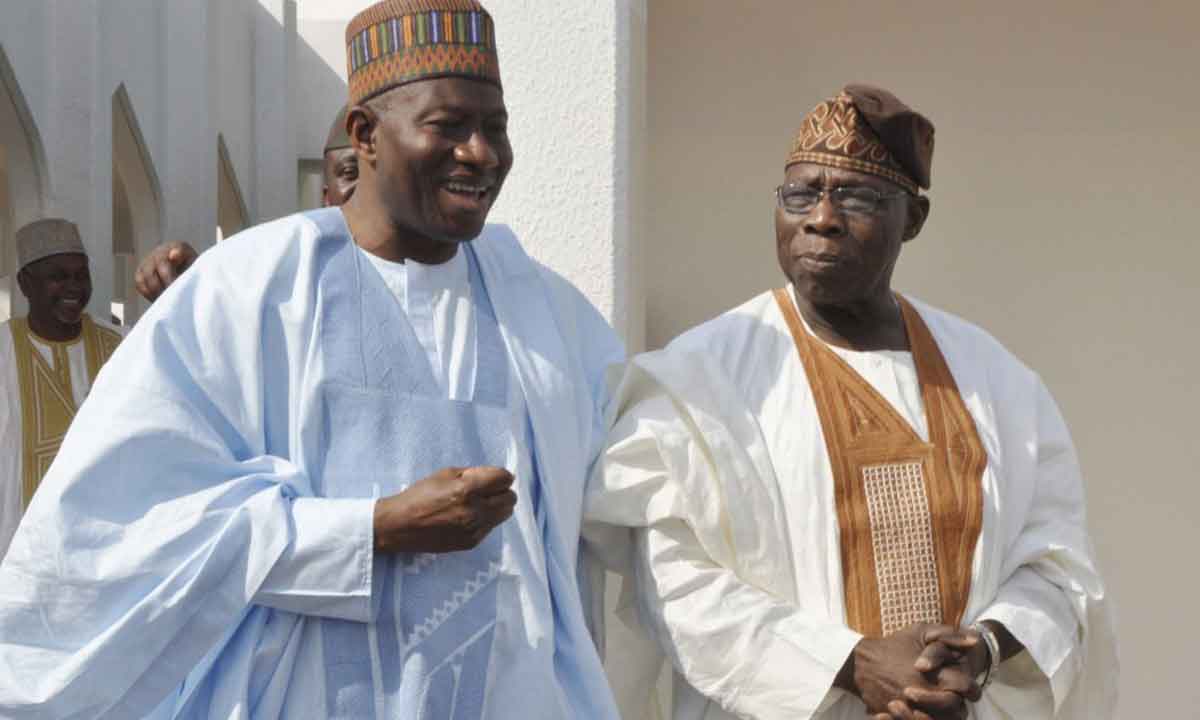
Obasanjo, Jonathan, others to receive N13.8bn maintenance allowance
The Federal Government has earmarked a total of N13,805,814,220 for the upkeep of former presidents, vice-presidents, heads of state, Chiefs of General Staff, retired heads of service, permanent secretaries, as well as retired heads of government agencies and parastatals in the 2024 fiscal year.
The beneficiaries include former Presidents Olusegun Obasanjo, Goodluck Jonathan and Muhammadu Buhari, as well as ex-vice-presidents Atiku Abubakar, Namadi Sambo and Prof Yemi Osinbajo.
Also expected to benefit from the windfall are ex-military Heads of State, General Yakubu Gowon and General Abdusalami Abubakar, as well as a former dictator and self-styled military President, General Ibrahim Babangida, and a former Chief of General Staff, Commodore Ebitu Ukiwe (retd.).
Also, N1tn was provisioned for the public service wage adjustment for government Ministries, Departments and Agencies (including arrears of promotion and salary increases, and payment of severance benefits and minimum wage-related adjustments).
A breakdown shows that the entitlements of former presidents/heads of states and vice-presidents/chief of general staff will cost N2.3bn, while N10.5bn is proposed as benefits for retired heads of service, permanent secretaries and professors.
The payment of severance benefits to retired heads of government agencies and parastatals is proposed to cost N1bn.
READ ALSO:
- There’s nothing hopeful around proposed 2024 budget – Ogundare
- Stakeholders seek Islamic financing for primary healthcare
- Ararume talks tough, says Tinubu disobeying court’s order
Other allocations include N65bn for the Presidential Amnesty Programme for the reintegration of transformed ex-militants; N1bn for the Office of the Presidential Adviser on Energy; and N108bn for unnamed special projects.
The government is also proposing the sum of N40bn to offset electricity debts owed power distribution companies by all MDAs.
The item listed as ‘Settlement of MDAs’ electricity debts’, was contained in the sectoral allocation details released by the Chairman, Senate Committee on Appropriations, Solomon Adeola, and obtained by Sunday PUNCH.
According to Adeola, the details of the budget have been released to allay the fears of lawmakers and Nigerians.
He noted that the details had been circulated to allow lawmakers to study and see the allocations TO various sectors.
The Executive Director, Association of Nigerian Electricity Distributors, Sunday Oduntan, in January 2022 revealed that all the Federal Government MDAs and the military owed the electricity distribution companies at least N90bn.
He said though discussions were ongoing as regards settlement, the debt had continued to pile up over the years since the power sector was privatised in November 2013.
He said, “All MDAs’ debt is more than N90bn and the military is part of that. We came on board in 2013 and since then, how much has been paid by the MDAs?
“There was a time when a former minister of power said they (the government) had concluded arrangements on how to settle the debt, but as I speak with you, the bills are still unpaid. Since privatisation, there have been issues around the MDAs’ debt.”
Though the government budgeted N27bn in 2022 and N40bn in 2023 for the settlement of the debt, it is unclear if it made payments to the Discos.
The ministries of Works, Finance, Education and Defence and others got lion’s shares of the N8.7tn capital component of the N27.5tn 2024 budget as contained in sectoral allocation details.
READ ALSO:
- Major shakeup in Federal Civil Service as FG redeploys directors, others
- Super Eagles captain, Ahmed Musa, ready for NPFL return
- Anambra to experience power outage for 5-days
In the proposed budget, the Ministry of Works is allocated N521.3bn, followed by the Ministry of Finance with N519.9bn, while N308.2bn is earmarked for the Ministry of Defence.
Similarly, the Federal Ministry of Health and Social Welfare is to get N304.4bn, while the Education ministry has an allocation of N265.4bn.
Others are Ministry of Power, N264.2bn, government-owned enterprises, N820.9bn; Tertiary Education Trust Fund, N665bn; Housing and Urban Development ministry, N96.9bn; Water Resources ministry, N87.7bn; and Police Affairs ministry, N69bn.
The National Assembly under statutory transfers gets N198bn; the Niger Delta Development Commission, N324.8bn; Universal Basic Education Board, N251.4bn; National Judicial Council, N165bn; North East Development Commission, N126bn; and Basic Health Care Provision Fund, N125.7bn.
Under capital supplementation, zonal intervention, otherwise called constituency projects for federal lawmakers, gets N100bn; special projects, N108bn; contingency (capital), N200bn; aid and grants funded projects, N685.6bn; and National Social Investment Programme Agency, N100bn.
Minister on budget
Meanwhile, the Minister of Information and National Orientation, Mohammed Idris, on Saturday expressed optimism that the 2024 budget would mark a transformative era in the country once it was passed by the National Assembly.
The minister, while declaring open the Kaduna State chapter of the Nigerian Institute of Public Relations Annual Public Lecture/Annual General Meeting, noted that the budget signified a pivotal step towards the realisation of Tinubu administration’s Renewed Hope Agenda.
In addition to its focus on development priorities, the minister noted that the budget demonstrated a commitment to fiscal responsibility.
According to him, the administration recognises the importance of prudent financial management as the foundation for long-term economic stability.
Idris said, “Just this week, he (Tinubu) presented the 2024 Appropriation Bill of N27.5tn to the National Assembly, the first full-year budget of his administration. The budget as presented signifies a pivotal step towards the realisation of his Renewed Hope Agenda by aligning fiscal strategies and priorities with broader national development objectives.
Obasanjo, Jonathan, others to receive N13.8bn maintenance allowance
News
Just in: Factional Zamfara assembly leaders want governor to represent budget

Just in: Factional Zamfara assembly leaders want governor to represent budget
A factional House of Assembly has emerged in Zamfara state with members demanding the re-presentation of the 2025 Appropriation Bill by Governor Dauda Lawal.
The group, made up of nine lawmakers who were suspended in February 2024 over allegations of misconduct, conspiracy, and illegal sitting, convened in Gusau, the state capital, and declared the formation of a parallel legislative body.
At the session, the lawmakers elected Hon. Bashir Aliyu Gummi as Speaker of the factional assembly.
During the sitting, the faction addressed several issues, including the state’s deteriorating security situation, economic challenges, and the recent reports of mass sackings within the state civil service allegedly carried out by the Lawal administration.
READ ALSO:
- 2027: Atiku remains the best to face Tinubu, says Dele Momodu
- NLC to IMF: Your reforms inflict hunger, poverty on masses
- Nigerians deserve truth about electricity, not propaganda, labour slams power minister
The group further demanded that Governor Lawal re-present the 2025 budget, arguing that the process followed in its initial passage was flawed. The governor had originally submitted the N545 billion Appropriation Bill to the widely-known State House of Assembly led by Speaker Bilyaminu Ismail Moriki in December 2024. The bill was passed and signed into law that same month.
Present at Wednesday’s session were Hon. Aliyu Ango Kagara (Talata Mafara South), Ibrahim Tudu Tukur (Bakura), Nasiru Abdullahi Maru (Maru North), and Faruk Musa Dosara (Maradun 1). Others included Bashar Aliyu (Gummi 1), Bashir Abubakar Masama (Bukkuyum North), Amiru Ahmed (Tsafe West), Basiru Bello (Bungudu West), and Mukhtaru Nasiru (Kaura Namoda North).
Just in: Factional Zamfara assembly leaders want governor to represent budget
News
NLC to IMF: Your reforms inflict hunger, poverty on masses

NLC to IMF: Your reforms inflict hunger, poverty on masses
The Nigeria Labour Congress (NLC) has taken a swipe at the International Monetary Fund (IMF) over its policy proposals to Nigeria and other African nations on how to rejuvenate their ailing economies.
Indeed, the NLC pointedly told the IMF that its conditionalities for giving loans to Nigeria and others were inflict pains of hunger and poverty on the masses.
The NLC President, Joe Ajaero, stated this when he received the IMF team team comprising the its Resident Representative for Nigeria, Christian H. Ebeke, and, Axel Schimmelpfennig from Washington, DC.
The purpose of the visit, it was learnt, was to assess how Nigerian workers and the general populace are being affected by the current socioeconomic environment and the hardship resulting from government policies.
The IMF delegation, led by Schimmelpfennig also sought insights from the NLC regarding the state of the labour market in Nigeria. According to them, the information gathered would contribute to the IMF’s annual country report for Nigeria.
Sources at the meeting disclosed that the IMF team acknowledged that the Nigerian government has been grappling with fiscal challenges since assuming office.
They emphasized that the IMF’s recommendations are purely advisory and not mandatory, based on the prevailing realities in each country.
The delegation expressed concern that, often, governments do not follow the IMF’s recommendations to the letter, instead adapting them to align with political objectives. In effect, the IMF attempted to distance itself from the adverse consequences of some recent economic reforms in Nigeria.
READ ALSO:
- Nigerians deserve truth about electricity, not propaganda, labour slams power minister
- INEC may allow Nigerians without PVCs to vote in 2027
- Air Peace suspends flights over NIMET strike
Nevertheless, the IMF team requested continued engagement with the NLC going forward.
Ajaero made it clear that governance should prioritize citizens’ welfare over profit-making.
News
‘Enough is enough’, Tinubu directs security chiefs to stop violent attacks

‘Enough is enough’, Tinubu directs security chiefs to stop violent attacks
President Bola Tinubu has ordered security operatives to end forthwith the violent attacks in some parts of the country, especially in Plateau, Borno, and Benue states.
He gave the directive during a meeting with security chiefs at the State House on Wednesday.
The meeting was attended by Nuhu Ribadu, the national security adviser (NSA); Mohammed Mohammed, director-general of the National Intelligence Agency (NIA); Emmanuel Undianeye, chief of defence intelligence; Oluwatosin Ajayi, director-general (DG) of the Department of State Services (DSS); and Femi Gbajabiamila, chief of staff (CoS) to the President.
Speaking with journalists after the meeting, Ribadu said Tinubu declared that “enough is enough” on the resurgence of violence in some parts of the country.
The NSA said the president directed security chiefs to work with the political authorities in states and at the grassroots level to find a lasting solution to the insecurity.
He said the security chiefs had acted on Tinubu’s previous instructions by meeting with political leaders in the affected communities and states.
The NSA said the meeting offered the security chiefs the opportunity to fully brief the president about the current security situation of the country.
“This time, we were able to sit with him for hours and give a proper briefing. We also took new instructions from him,” he said.
“Insecurity is not only a government problem.
“It also involves the subnational units — the communities, local governments, and especially the governors. The president directed that we work more closely with them.
“Some of these problems are community-related. While not entirely so, that element plays a significant role.
“Mr. President is working hard to ensure that Nigeria enjoys peace and stability. We are not relenting. We will not stop until we get the results he demands.”
On the resurgence of violent attacks in Borno, Ribadu said the terrorists were planting explosives during the period of relative peace in the state.
“This enemy does not give up easily. When there’s peace for a long time, they try to shock the public with an isolated incident,” he said.
The NSA said the security situation in the country is not yet at 100 percent, while noting that there is “significant improvement”.
Since the beginning of the month, many have been killed in some communities in Plateau State.
Benue State has also recorded violent attacks as over 50 people were killed in Ukum and Logo LGAs on April 18.
-

 metro20 hours ago
metro20 hours agoOmokri : How Tinubu’s political mastery started with Abiola, says El-Rufai, Obi’s forces can’t stop him
-

 metro3 days ago
metro3 days agoI’m not in supremacy battle with Ooni, says new Alaafin
-

 Education14 hours ago
Education14 hours agoJAMB officials seize candidates’ hijab at Caleb varsity, Muslim students kick
-

 Entertainment2 days ago
Entertainment2 days agoP-Square: Jude Okoye freed after two months detention
-

 International14 hours ago
International14 hours agoUS releases 41 countries granted 90-day entry without visas (full list)
-
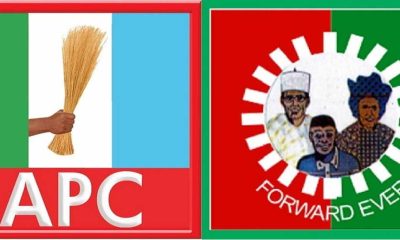
 Politics2 days ago
Politics2 days agoLabour Party collapses into APC in Plateau
-
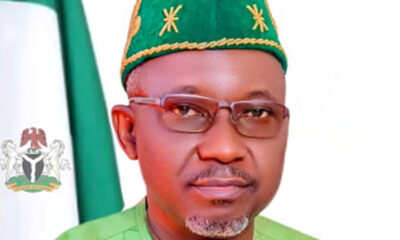
 Business3 days ago
Business3 days agoNigeria’s gas production increases by 15.6% to 227,931.65 mscf
-
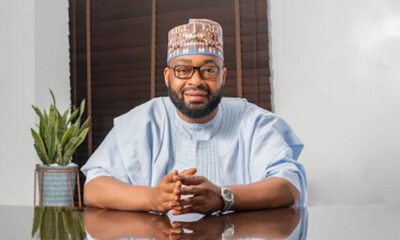
 metro2 days ago
metro2 days agoNiger Gov Bago makes U-turn on dreadlocks ban after backlash

